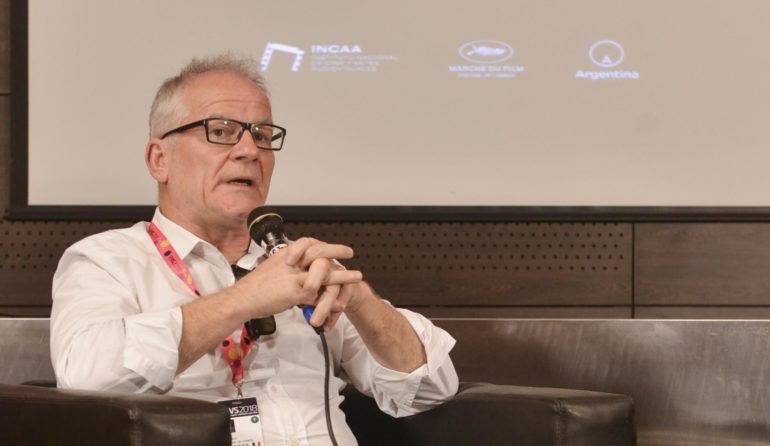Ventana Sur: Thierry Fremaux on Netflix, the Oscars, Argentine Cinema, Educating Spectators
By John Hopewell
LOS ANGELES (Variety.com) – BUENOS AIRES — “You can’t condition Cannes on an event which takes place in Hollywood the following March,” said Thierry Frémaux in a keynote speech at Ventana Sur, “Questions on the Present of Cinema,” which took in Netflix, “Roma,” and the need to educate audiences for more complex cinema.
Cannes Festival’s charter insisted that it should show films from over the world, not just from Hollywood, Frémaux insisted, hitting back at criticism of the relative lack of big U.S. titles in this year’s edition.
It was, however, on Netflix that Frémaux talked for greater length, sometimes surprising the audience. Admitting to being a Netflix subscriber – it will release Springsteen on Broadway” on Dec. 15, a record of the one-man concerts of a musician Frémaux revers – Frémaux said Netflix and the Cannes Festival are in some ways very similar, a remark met with guarded laughter by a largely Latin American industry audience on the first day of Ventana Sur.
But Frémaux, despite a large sense of humor, was speaking quite seriously. He cited Alfonso Cuarón, who said that “Roma” could never have been made as it was without Netflix financing, and “Girl,” an Un Certain Regard standout which Netflix has acquired for North America.
Netflix will bet on risky film projects, Frémaux argued, praising its executives for their large knowledge of cinema, often deriving from their cine-club backgrounds, he added, and also for Netflix’s backing “Roma.”
“It’s singular that the most famous OTT platform of an era would buy a difficult film – a very Mexican, personal, film, in black and white, about a maid. Yet yesterday the Los Angeles Film Critics’ Association voted it best film of the year, and it’s step forward in the history of cinema.”
Yet when questioned about his reaction to Gaumont head Jerome Séydoux’s attack on Venice Festival director Alberto Barbera for selecting “Roma,” a title which Séydoux argued was not a film given it would not have its first release in cinemas, Frémaux said he understood Séydoux’s position. -“I run three commercial-sector cinema theaters in Lyon, so I know what he’s talking about.”
Asked if he thought if the 600 screen theatrical bow for “Roma” could persuade Netflix to make a similar exception for films selected for competition at Cannes, Frémaux refused to drawn.
“Let’s just say that last year with Netflix was “Part 1, what happened this year Part 2, and next year will be Part 3, and I don’t know how it will be,” Frémaux countered cautiously.
Speaking in Spanish with an Argentine accent – When I talk to Pedro Almodóvar, he asks me after five minutes if we could talk in English,” Frémaux joked – the head of the Cannes Festival was firm on one thing: “We work for cinema in cinemas. the Lumière brothers invented cinema three times, technologically, as an art form, and as a collective viewing experience. Joel Coen told me that Netflix was the only company that wanted to back his last film. But seeing it on Netflix is not the same as seeing it in the cinema, just as going to a concert is n0t the same as listening to a record.”
Pressed on his view of Argentine cinema, Frémaux praised its historical record ofgovernmental support and its caliber: Down the years,o“Argentina has really put its back behind Argentine filmmaking and its cinema has put Argentina on the international map, just as Romania cinema has done the same for Romania.”
Currently, independent cinema, especially arthouse titles, face diminishing box office in their home territories and contracting theatrical openings overseas. The longterm solution, Frémaux argued, was education, but not just training filmmakers, but also audiences.
“Paul Schrader, a genius screenwriter, pointed out that the New Hollywood of the 1970s had not only a brilliant generation of directors but also of spectators,” Frémaux said.
He added: “A demanding, educated public is crucial. This is a question of social education. It’s as if the world has now moved back to the 1930s or 195os. There has to be a pact of confidence, between directors, films, the public and the press. This can now been seen in drama series. It’s been lost a little [in cinema].”
The conversation with Thierry Frémaux was conducted by Variety’s John Hopewell.

